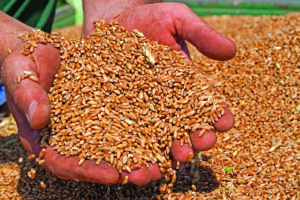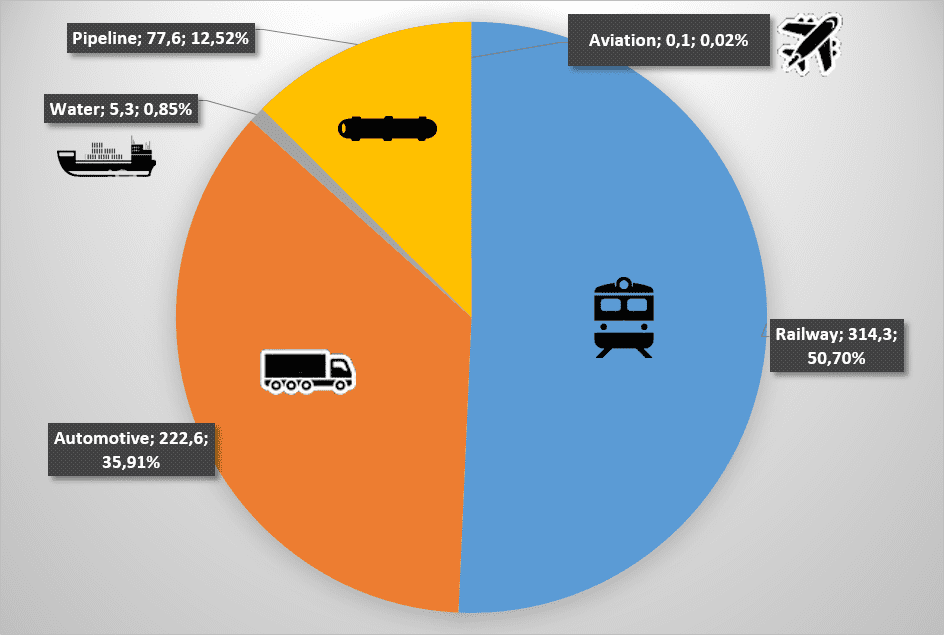
Ukraine in January-April this year reduced the export of titanium-bearing ores and concentrate by 43.7% compared to the same period last year, to 129,212 tonnes.
According to statistics released by the State Customs Service (STS), in monetary terms, the export of titanium-bearing ores and concentrate decreased 18.6%, to $47.247 million.
At the same time, major exports were to the Czech Republic (50.79% of supplies in monetary terms), the United States (18.45%) and China (7.98%).
Ukraine in January-April 2022 imported 100 tonnes of similar products from Senegal for $138,000, while in January-April 2021 it imported 180 tonnes from Senegal for $160,000.
As reported, Ukraine increased the export of titanium-bearing ores and concentrate in kind by 3% in 2021 compared to 2020, to 553,051 tonnes. In monetary terms, the export of titanium-bearing ores and concentrate grew by 17%, to $161.914 million. Majot exports were to Mexico (21.23% of supplies in monetary terms), China (18.17%) and the Czech Republic (14.07%).
In 2021, Ukraine imported 1,172 tonnes of titanium-containing ores worth $1.227 million from Senegal (87.03%) and Germany (12.97%), while in 2020 it imported 1,010 tonnes worth $855,000.
In Ukraine, at present, titanium-bearing ores are mined mainly in the PJSC United Mining and Chemical Company (UMCC), under whose management the Vilnohirsk Mining and Metallurgical Plant (Dnipropetrovsk region) and Irshansk Mining and Processing Plant (Zhytomyr region) were transferred, as well as Mezhdurechensk Mining and Concentration Complex LLC and Valki-Ilmenite LLC (both LLC are located in Irshansk, Zhytomyr region).
In addition, the production and commercial company Velta (Dnipro) built a mining and concentration complex at the Birzulivske deposit with a capacity of 240,000 tonnes of ilmenite concentrate per year.
Holding company Velta Group Global Ltd. registered in London in November 2011.

Antonov State Enterprise (Kyiv) has reported that due to the impossibility of operating international flights from Ukraine, five An-124-100 Ruslan aircraft are temporarily based at the airport in Leipzig (Germany).
“The work of the branch of the air transport division (ATP) of the Antonov State Enterprise, known in the world as the Antonov Airlines, has been organized there, and a base has been equipped for the maintenance of these aircraft,” the company said on Facebook.
Antonov said that this allows the company to continue fulfilling commercial and government orders for the transportation of super-heavy and oversized cargo.
“After the victory over the Russian invaders and the completion of a set of works to restore the efficiency of the Kyiv-Antonov-2 airport, it will again become the base for the Ruslan fleet of Antonov Airlines,” the company added.
As reported, due to Russian hostile actions, the Antonov base in Hostomel was destroyed, the base at Sviatoshyn was damaged, An-26, An-74 aircraft and the flagship of the world aviation fleet An-225 Mriya were destroyed.
In addition, according to Antonov State Enterprise, five more aircraft were damaged – An-12, An-22, An-28, An-132D and An-124-100-150.
The company said that on the eve of the Russian invasion, five An-124 aircraft were withdrawn from Ukraine; An-26, An-74 and An-225 Mriya aircraft were also ready to leave the country on February 24.
Antonov State Enterprise initiated the foundation of the International Fund for the revival of the An-225 Mriya transport aircraft.

Ukraine in January-April this year reduced the export of cast iron by 52.7% compared to the same period last year, to 451,142 tonnes.
According to statistics released by the State Customs Service (SCS), over the specified period, the export of cast iron in monetary terms decreased 50.4%, to $220.179 million.
At the same time, exports were carried out mainly to the United States (52.42% of deliveries in monetary terms), Turkey (18.58%) and Italy (17.59%).
In January-April 2022, Ukraine imported 15 tonnes of cast iron from Germany for $25,000, while in the first four months of 2021 it imported 46 tonnes of cast iron for $49,000 from Germany (76%) and Slovakia (24%).
As reported, Ukraine in 2021 increased the export of cast iron by 4.2% compared to 2020, to 3.236 million tonnes, the export of cast iron in monetary terms grew by 78.1%, to $1.643 billion. At the same time, exports were carried out mainly to the United States (53.61% of deliveries in monetary terms), Italy (22.08%) and Turkey (9.74%).
In 2021, Ukraine imported 185 tonnes of pig iron worth $226,000 from Germany (74.34%), the Russian Federation (20.35%) and Slovakia (5.31%), while in 2020 it imported 593 tonnes worth $417,000.

For the period from May 1 through May 19, 2022, Ukraine exported 643,000 tonnes of grain crops, while the export rate increased: for the week from May 12 to May 19, 344,000 tonnes were delivered to foreign markets, while for a week and a half of this month (from May 1 through May 12) this figure amounted to 299,000 tonnes.
However, as reported on the website of the Ministry of Agrarian Policy and Food on Thursday, the rate of grain exports since the beginning of May this year is 2.8 times lower compared to the same period last year (1.8 million tonnes were exported from May 1 to May 19, 2021).
Such a decline in the ministry is explained by the blockade of Ukrainian seaports, a key export infrastructure, by the troops of the aggressor country of the Russian Federation.
According to the Ministry of Agrarian Policy, since the beginning of 2021/22 (July-June) and as of May 19, the country has exported 46.51 million tonnes of grain and leguminous crops, which is 13.8% higher than the figures for the same date of the previous year. This excess of last year’s indicators is caused by a record harvest in the current year and the high intensity of its export before the Russian invasion on February 24.
In total, from the beginning of 2021/22 as of May 19, 2022, Ukraine had exported 18.54 million tonnes of wheat (18.7% more compared to the same date in 2020/21), 21.83 million tonnes of corn (6.9% more), 5.68 million tonnes of barley (37.2% more), 70,600 tonnes of flour (35.7% less).
For the period from May 12 to May 19, 333,000 tonnes of corn, 10,000 tonnes of wheat and 600 tonnes of flour were exported. Barley and rye were not exported during the specified period. In total, since the beginning of May, 617,000 tonnes of corn, 16,000 tonnes of wheat, 8,000 tonnes of barley and 1,100 tonnes of flour have been exported.
If to compare the current data of the agro-industrial complex portal with its indicators as of February 21, the last update before the Russian military invasion of Ukraine, it could be established that during the war Ukraine exported 3.97 million tonnes of grain and leguminous crops, of which 3.14 million tonnes of corn, 690,000 million tonnes of wheat, 110,000 tonnes of barley and 4,000 tonnes of flour.
Volumes of cargo transportation in Jan-Nov 2021, mln tons
